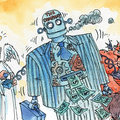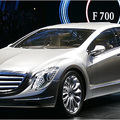Russia’s opposition is feeble, floundering and fading
| |
 | |
AT A recent gathering of Other Russia, a loose coalition of liberals, nationalists and communists who oppose President Vladimir Putin, a pro-Kremlin youth group lit candles and played a funeral march. The stunt cut close to the bone.
Russia’s opposition may not yet be dead, but it is in a deep coma. The Kremlin has hollowed out politics by rigging rules on parties and elections. It has made it hard for the opposition to put its case on television and sent truncheon-wielding police to dispel protesters. But infighting, lack of ideas and above all low public support have done as much to hurt the opposition. Just four months before a parliamentary election and eight months before the presidential poll, it is divided, demoralised and lacks a single candidate. Mr Putin’s approval rating, meanwhile, stands at a majestic, if propaganda-fuelled, 85%.
Some of Other Russia’s important figures, including Mikhail Kasyanov, an ex-prime minister, and Vladimir Ryzhkov, an independent member of parliament, have left after a split with Garry Kasparov, a former world chess champion turned activist, largely because of clashing ambitions and trivial rows over procedure. Mr Kasparov and Mr Kasyanov, who says he wants to be president, argued for seven hours just over how to nominate candidates for parliament and the presidency. Their bickering has let down those who have risked attending Other Russia protests. “The bear has not yet been killed, but they’re already trying to divide its skin,” says Eduard Limonov, leader of the banned National Bolshevik Party.
The two older liberal parties, Yabloko and the Union of Right Forces (SPS), have hardly fared better. For years they have failed to combine, though both seek votes from the same sort of people; neither passed the 5% threshold for representation at the last parliamentary election, four years ago. That threshold has now been raised to 7%; the latest polls suggest that neither has a chance of getting over it. “I’m not scared of the Kremlin, but when you can’t agree among your own people, it’s time to leave politics,” says Irina Khakamada, who was a candidate for the presidency in 2004.
But the truth is that both SPS and Yabloko anyway tend to stay within bounds set by the Kremlin. SPS was founded and is funded by Anatoly Chubais, who runs Russia’s state-backed electricity monopoly. He gets on well with Mr Putin and relies on his support for electricity reform. SPS is not planning to put up its own challenger for the presidency (which the Kremlin’s candidate will almost certainly win). It is even nervous about putting some of its more outspoken activists on its list for the parliamentary elections.
The problem, however, runs deeper. As Boris Nemtsov, one of the SPS’s more plausible leaders, says: “There is no real demand for a liberal opposition in Russian society.” Many Russians still associate liberals such as Messrs Nemtsov and Chubais with impoverishment, chaos and loss of national pride in the 1990s. As members of Boris Yeltsin’s government, they talked of macroeconomic stability and fiscal discipline but never presented policies that resonated among ordinary Russians. Some of their oft-maligned reforms have come to fruition, ironically, under Mr Putin: helped by high oil prices, the economy is growing around 7% a year, the government budget is in surplus, inflation has been tamed and debt paid off.
Few Russians care enough about freedom of speech or human rights to risk their improving lifestyle. “The Kremlin has done a deal with the Russian people,” says Mr Kasyanov. ‘“Citizens! Enjoy life, travel abroad, buy cars, but don’t get involved in politicsIf your patriotic feelings start to stir, we’ll satisfy them.’”
Indeed, whereas the appetite for liberal ideas is weak, nationalism remains strong. The Kremlin has set up parties of every hue to split and steal the opposition vote, while squashing any party it cannot control—and the nationalist simulacrums have fared worryingly well. If anyone breaks through the Kremlin’s stranglehold, it is unlikely to be the liberals.





